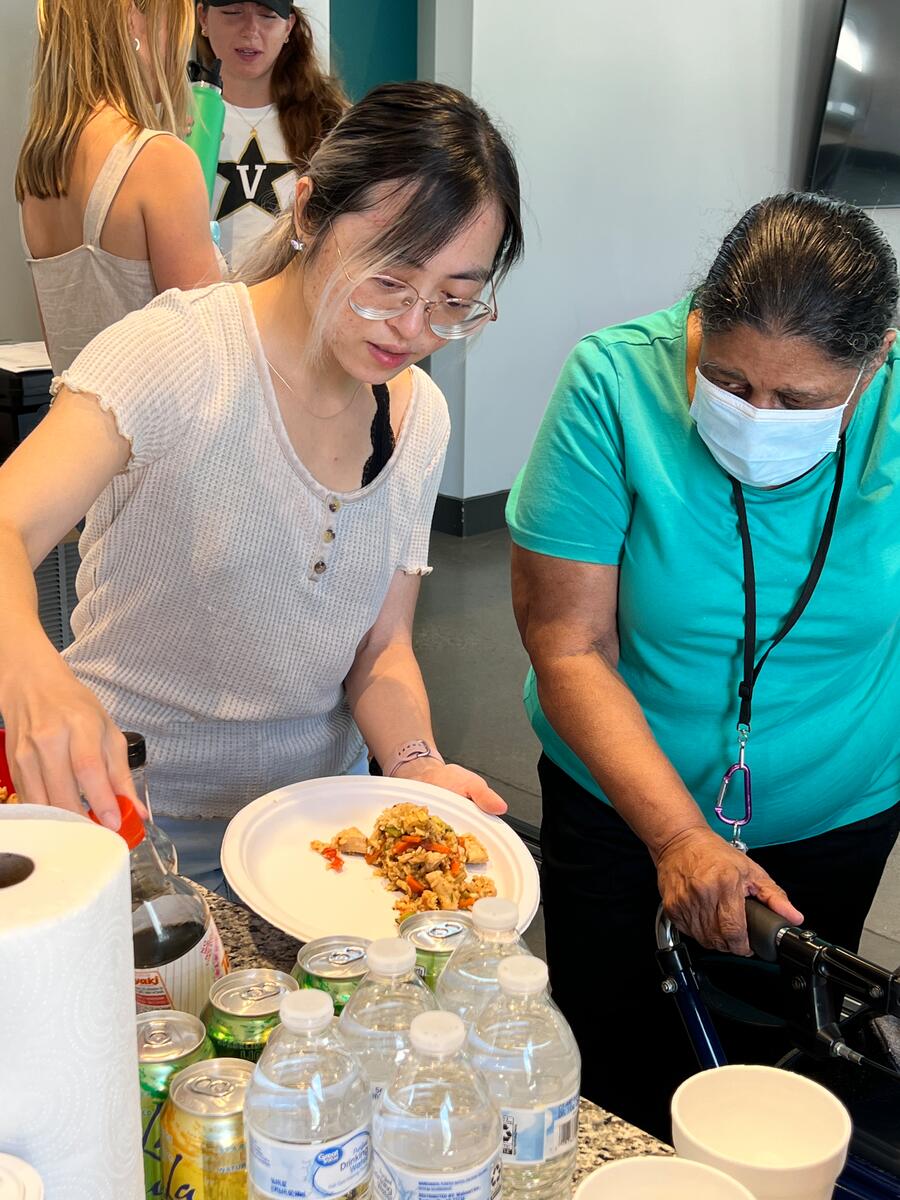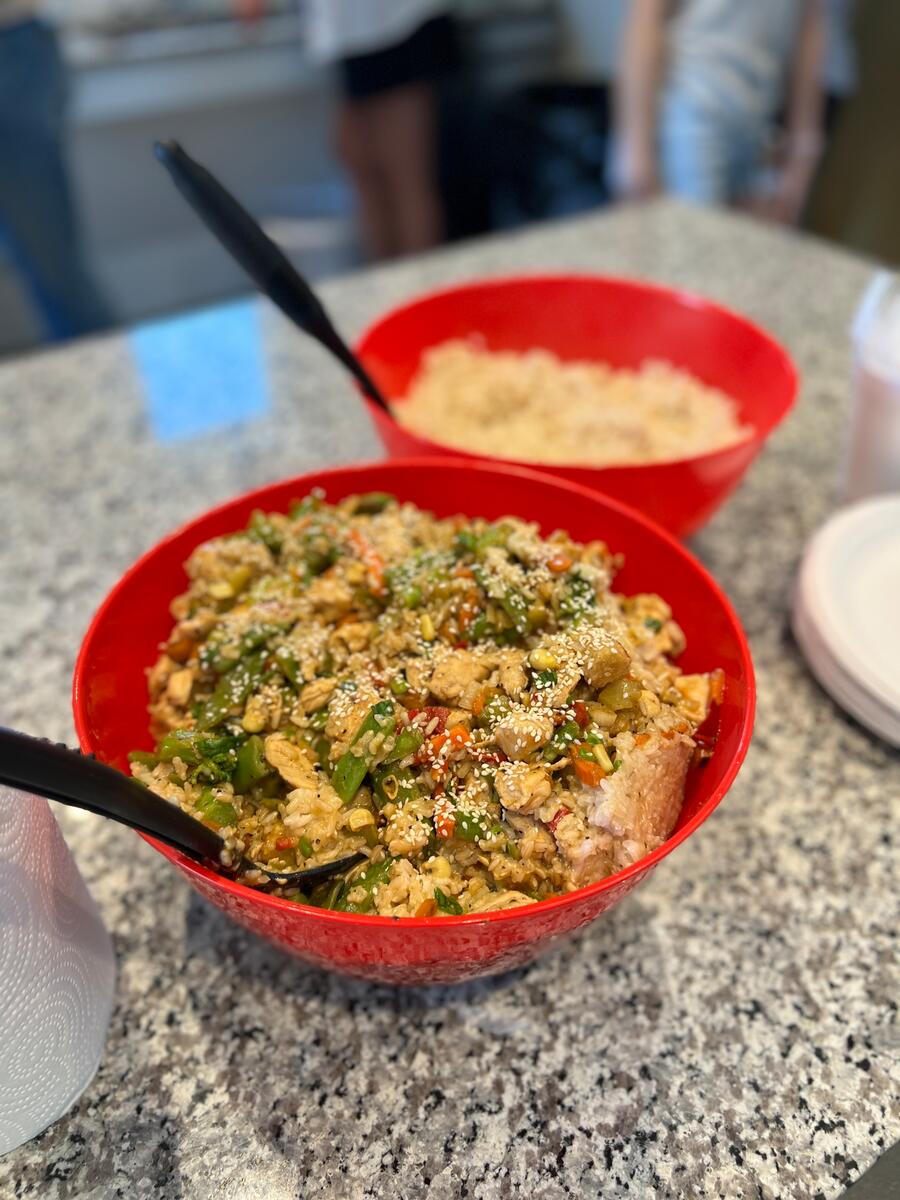By Tatum Lyles Flick
Communications Specialist
Dishes clink and the delicious smell of stir fry fills the air as a small group of nursing students laugh and talk with residents at an Urban Housing Solutions community center. Vanderbilt University School of Nursing students are there to demonstrate food preparation techniques and healthy recipes for local senior citizens, as part of an Enhancement of Community and Population Health course series.
The class connects students with community organizations to create, complete and assess quality improvement projects.
“They’re teaching us how to cook healthy stuff,” said resident and program participant Marvin Williams, adding that the program has helped him make better food choices and follow a healthier lifestyle. “I won the crockpot and the waffle iron.” Williams learned a new salad recipe from the workshop, using cauliflower. When he tried it at home, he “added a little twist to it—vinegar for a little kick,” Williams said.

The students spent a semester working with community members and the Urban Housing Solutions and McGruder Family Resource Center to determine what services might help improve health outcomes for seniors the most.
“Food insecurity is a big issue, as is health disparity for lower-served, less economically resourced areas,” said Alex Biro, a PreSpecialty student who will begin her studies in the Adult-Gerontology Primary Care Nurse Practitioner Program in August. “Being able to provide basic health teaching points to provide disease management and prevention through diet is a very doable fix, when there’s someone there to help.”
Recognizing the need for healthy cooking ideas, the students designed this project and started sharing healthy eating information through the Community Kitchen presentations.
The Community Kitchen project, one of several funded by the United Way of Greater Nashville, costs around $200 per event and serves 20 to 30 people, a point which helps participants understand that eating healthy does not have to be expensive.
“Our support of Community Kitchens, specifically in the North Nashville community, is rooted in our understanding of the lack of food resources available in the area,” said Rebecca Carter, United Way director of community impact.

Each meal costs $10 or less to prepare for a family of four.
“Meals are designed with ingredients that people can get at their local grocery store and are easy to make in 30 minutes or less,” said Instructor in Clinical Nursing Leah Branam, MSSW, LMSW, who taught the course. “United Way funds cover the cost of creating the meal for people to try and the meal kits we send home with participants.”
The United Way grant covers about 12 Community Kitchen events per year, and is funding the project through end of June 2023.
“In addition to the teaching kitchens, we support community gardening efforts because we know when families grow their own produce, they increase consumption and can improve health outcomes,” Carter said. “Community gardens also foster healthy connections within the community and encourage multi-generational engagement. Offering a community kitchen brings all of this together! Families can learn how to prepare what they have grown, can engage in meaningful activities together, and can increase access to resources. It’s a great culmination of the efforts contributed by different partners and nonprofits in the North Nashville community.”
Branam’s students teach participants to maximize their resources and make healthier choices.
“The Community Kitchen program is designed to work within income restraints and offer an opportunity to help folks try new foods,” Branam said. “This particular project is for older adults, as so many of them are managing diabetes, hypertension or prediabetes. We talk through options like reducing carbs or reducing sodium and share strategic ways to maintain the tastiness of food so they can still really enjoy it.”
The program helped seniors learn to make their favorite meals healthier, as students presented recipes and sample meals for things like healthy macaroni and cheese, made with Greek yogurt, vegetables and whole wheat pasta. The program helped students gain an understanding of how patients’ lifestyles, such as meal choices, might affect their health, and how they, as future practitioners, can encourage patients to make healthier choices. “We’re lucky that we are able to offset everything we do academically with stuff in the community,” Biro said. “It makes for a nice balance. I am going to be in primary care, so I liked being in a different community than what we might see in the hospital.”
The Community Kitchen program also funded raffles for cooking supplies, supporting people with things they can use in the kitchen.
“Last week they took a big squash, cut it in half, oiled it, seasoned it with salt and pepper, and baked it,” Williams said about spaghetti squash. “Once it was done, they took a fork and pulled out something that looked like noodles. They put the sauce on it and it was good!”